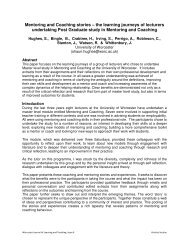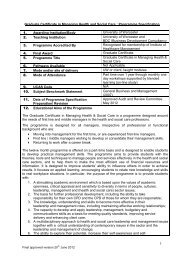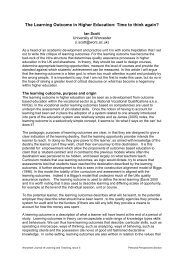Enriching opportunities for people living with dementia: The ...
Enriching opportunities for people living with dementia: The ...
Enriching opportunities for people living with dementia: The ...
You also want an ePaper? Increase the reach of your titles
YUMPU automatically turns print PDFs into web optimized ePapers that Google loves.
382 D. J. Brooker & R. J. WoolleyDepartment of Health (2001). Fit <strong>for</strong> the Future? NationalRequired Standards <strong>for</strong> Residential and Nursing Homes <strong>for</strong> OlderPeople. London: HMSO.Featherstone, K., James, I. A., Powell, I., Milne, D., &Maddison, C. (2004). A Controlled Evaluation of a TrainingCourse <strong>for</strong> Staff Who Work <strong>with</strong> People <strong>with</strong> Dementia.Dementia, 3, 181–194.Finnema, E., Dröes, R-M., Ribbe, M., & Van Tilburg, W.(2000). <strong>The</strong> effects of emotion-oriented approaches in the care<strong>for</strong> persons suffering from <strong>dementia</strong>: A review of the literature.International Journal of Geriatric Psychiatry, 15, 141–161.Finnema, E., Dröes, R.-M., Ettema, T., Ooms, M., Adèr, H.,Ribbe, M., et al. (2005). <strong>The</strong> effect of integrated emotionorientedcare versus usual care on elderly persons <strong>with</strong><strong>dementia</strong> in the nursing home and on nursing assistants:A randomized clinical trial. International Journal of GeriatricPsychiatry, 20, 330–343.Garner, P (2004). A Special place to keep. Journal of DementiaCare, 12, 11–12.Gigliotti, C. M., Jarrott, S. E., & Yorgason, J. (2004). HarvestingHealth: Effects of three types of horticultural therapy activities<strong>for</strong> persons <strong>with</strong> <strong>dementia</strong>. Dementia, 3, 161–170.Gitlin, L. N., Liebman, J. M. S., & Winter, L. (2003). AreEnvironmental Interventions Effective in the Managementof Alzheimer’s Disease and Related Disorders? A Synthesis ofthe Evidence. Alzheimer, 4, 85–107.Hoek, J. F., Ribbe, M. W., Hertogh, C. M., & Van DerVleuten, C. P. M. (2003). <strong>The</strong> role of the specialist physicianin nursing homes: <strong>The</strong> Netherlands’ experience. InternationalJournal of Geriatric Psychiatry, 18, 244–249.Holmes, C., Hopkins, V., Hens<strong>for</strong>d, C., Maclaughlin, V.,Wilkinson, D., & Rosenvinge, H. (2002). Lavender oil as atreatment <strong>for</strong> agitated behaviour in severe <strong>dementia</strong>: A placebocontrolled study. International Journal of Geriatric Psychiatry,17, 305–308.James, I., Reichelt, F. K., Morse, R., Mackenzie, L., &Mukaetova-Ladinska, E. (2005). <strong>The</strong> therapeutic use of dollsin <strong>dementia</strong> care. Journal of Dementia Care, 13, 19.Jarrott, S. E., & Bruno, K. (2003). Intergenerational activitiesinvolving persons <strong>with</strong> <strong>dementia</strong>: An observational assessment.American Journal of Alzheimer’s Disease and Other Dementias, 18,31–37.Lintern, T., Woods, R., & Phair, L. (2000a). Be<strong>for</strong>e and aftertraining: A case study of intervention. Journal of Dementia Care,8, 15–17.Lintern, T., Woods, R., & Phair, L. (2000b). Training is notenough to change care practice. Journal of Dementia Care, 8,15–17.Margallo-Lana, M., Swann, A., O’Brien, J., Fairbairn, A.,Reichelt, K., Potkins, D., et al. (2001). Prevalence andpharmacological management of behavioural and psychologicalsymptoms amongst <strong>dementia</strong> sufferers <strong>living</strong> in care environments.International Journal of Geriatric Psychiatry, 16, 39–44.Marshall, M. J., & Hutchinson, S. A. (2001). A critique ofresearch on the use of activities <strong>with</strong> persons <strong>with</strong> Alzheimer’sdisease: A systematic literature review. Journal of AdvancedNursing, 35, 488–496.May, H., & Edwards, P. (In press) Person Centred Care Planning:<strong>The</strong> Milestones Templates London: Jessica Kingsley Publications.Mayall, E., Oathamshaw, S. L. K., & Pusey, H. (2004).Development and piloting of a multidisciplinary trainingcourse <strong>for</strong> detecting and managing depression in the olderperson. Journal of Psychiatric and Mental Health Nursing, 11,165–171.Mckee, K. J., Wilson, F., Chung, M. C., Hinchliff, S.,Goudie, F., El<strong>for</strong>d, H., et al. (2005). Reminiscence, regretsand activity in older <strong>people</strong> in residential care: Associations<strong>with</strong> psychological health. British Journal of Clinical Psychology,44, 543–562.Moniz-Cook, E., Millington, D., & Silver, M. (1997). Residentialcare <strong>for</strong> older <strong>people</strong>: Job satisfaction and psychological healthin care staff. Health and Social Care in the Community, 5,124–133.Moniz-Cook, E., Agar, S., Silver, M., Woods, R., Wang, M.,Elston, C., et al. (1998). Can staff training reducebehavioural problems in residential care <strong>for</strong> the elderlymentally ill? International Journal of Geriatric Psychiatry, 13,149–158.Moniz-Cook, E., Woods, R., Gardiner, E., Silver, M., & Agar, S.(2001). <strong>The</strong> Challenging Behaviour Scale (Cbs): Developmentof a Scale <strong>for</strong> Staff Caring <strong>for</strong> Older People in Residential andNursing Homes. British Journal of Clinical Psychology, 40,309–322.Moniz-Cook, E., Woods, R. T., & Richards, K. (2001).Functional Analysis of challenging behaviour in <strong>dementia</strong>:<strong>The</strong> role of superstition. International Journal of GeriatricPsychiatry, 16, 45–56.Opie, J., Doyle, C., & O’Connor, D. W. (2002). Challengingbehaviours in nursing home residents <strong>with</strong> <strong>dementia</strong>:A randomized controlled trial of multidisciplinaryinterventions. International Journal of Geriatric Psychiatry, 17,6–13.Orrell, M., Spector, A., Thorgrimsen, L., & Woods, B. (2005). Apilot study examining the effectiveness of maintenanceCognitive Stimulation <strong>The</strong>rapy (MCST) <strong>for</strong> <strong>people</strong> <strong>with</strong><strong>dementia</strong>. International Journal of Geriatric Psychiatry, 20,446–451.Pitkala, K. H., Laurila, J. V., Strandberg, T. E., & Tilvis, R. S.(2004). Behavioral symptoms and the administration ofpsychotropic drugs to aged patients <strong>with</strong> <strong>dementia</strong> in nursinghomes and in acute geriatric wards. InternationalPsychogeriatrics, 16, 61–74.Proctor, R., Burns, A., Stratton Powell, H., Tarrier, N.,Faragher, B., Richardson, G., et al. (1999). Behaviouralmanagement in nursing and residential homes: A randomisedcontrolled trial. <strong>The</strong> Lancet, 354, 26–29.Puls<strong>for</strong>d, D., Rush<strong>for</strong>th, D., & Connor, I. (2000). Woodlandstherapy: An ethnographic analysis of a small-group therapeuticactivity <strong>for</strong> <strong>people</strong> <strong>with</strong> moderate or severe <strong>dementia</strong>. Journal ofAdvanced Nursing, 32, 650–657.Purandare, N., Burns, A., Challis, D., & Morris, J. (2004).Perceived mental health needs and adequacy of serviceprovision to older <strong>people</strong> in care homes in the UK: A nationalsurvey. International Journal of Geriatric Psychiatry, 19,549–553.Rantz, M. J., Popejoy, L., Petroski, G. F., Madsen, R. W.,Mehr, D. R., Zwygart, M., et al. (2001). Randomized ClinicalTrial of a Quality Improvement Intervention in NursingHomes. <strong>The</strong> Gerontologist, 41, 525–538.Robson, C. (1993). Real world research: A resource <strong>for</strong> social scientistsand practitioner-researchers. Ox<strong>for</strong>d: Blackwell.Spector, A., Davies, S., Woods, B., & Orrell, M. (2000a). Realityorientation <strong>for</strong> <strong>dementia</strong>: A systematic review of the evidenceof effectiveness from randomized controlled trials. <strong>The</strong>Gerontologist, 40(2), 206–212.Spector, A., Orrell, M., Woods, B., & Orrell, M. (2000b). Realityorientation <strong>for</strong> <strong>dementia</strong>. <strong>The</strong> Cochrane Database of SystematicReviews (2), Art. No.:CD001119.
















